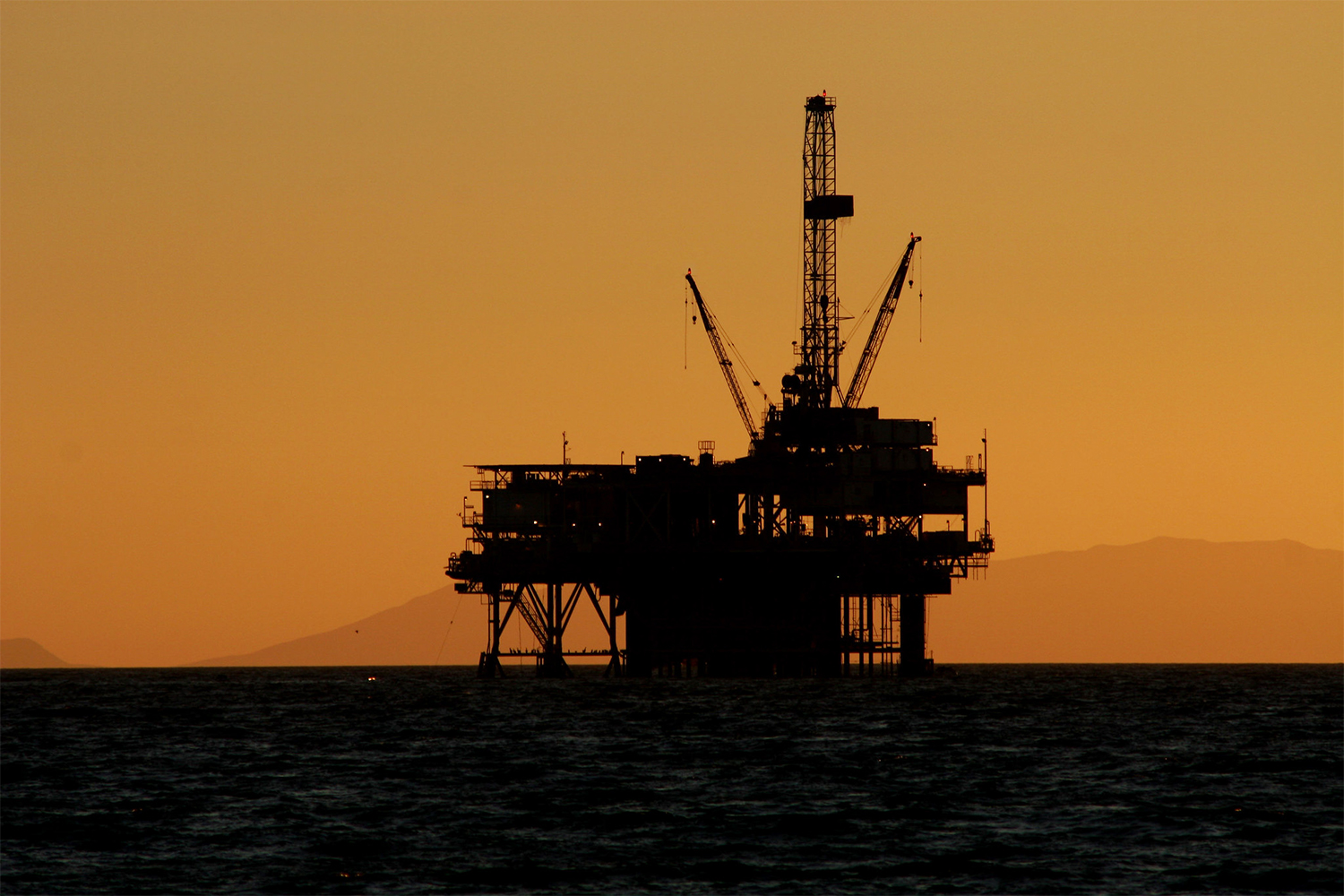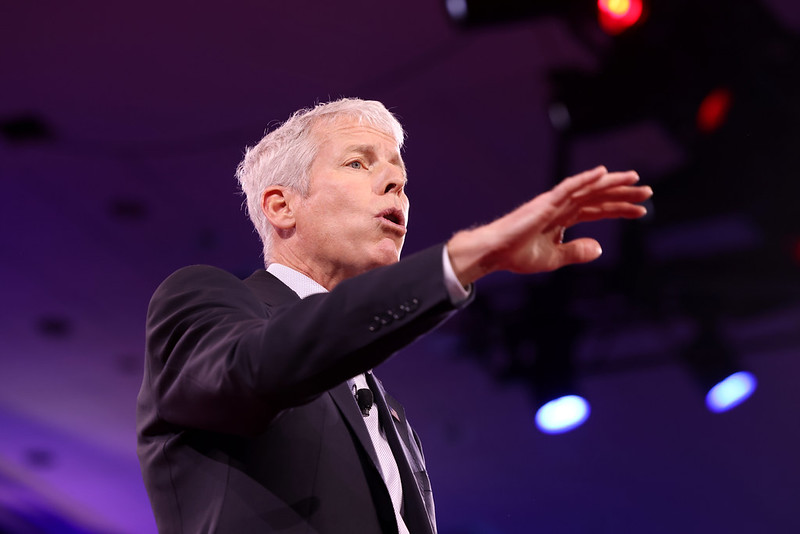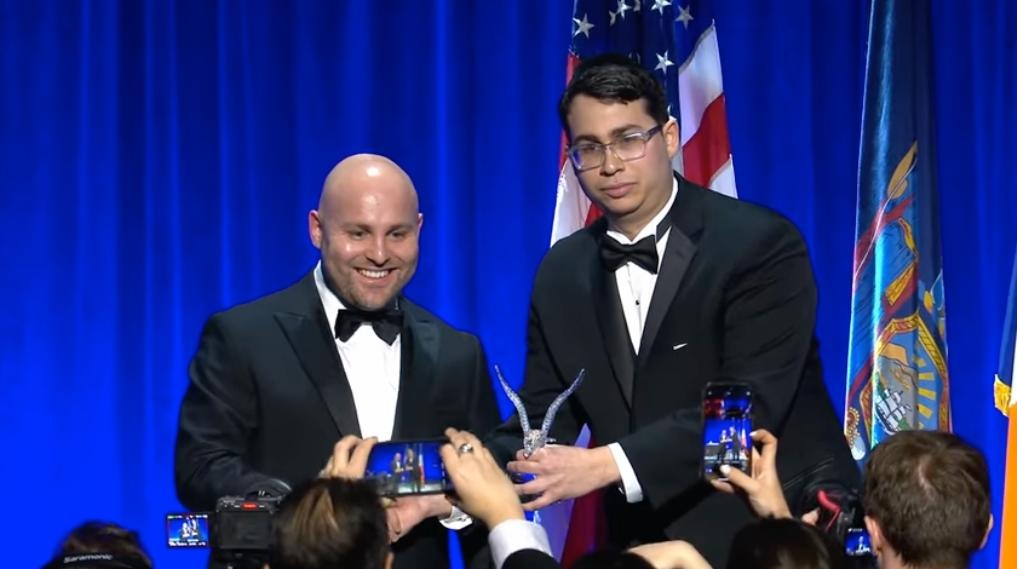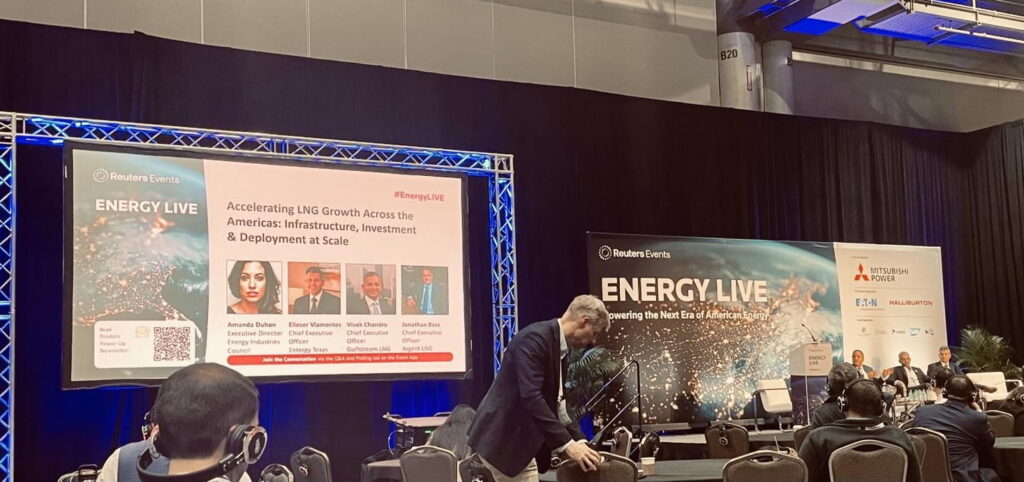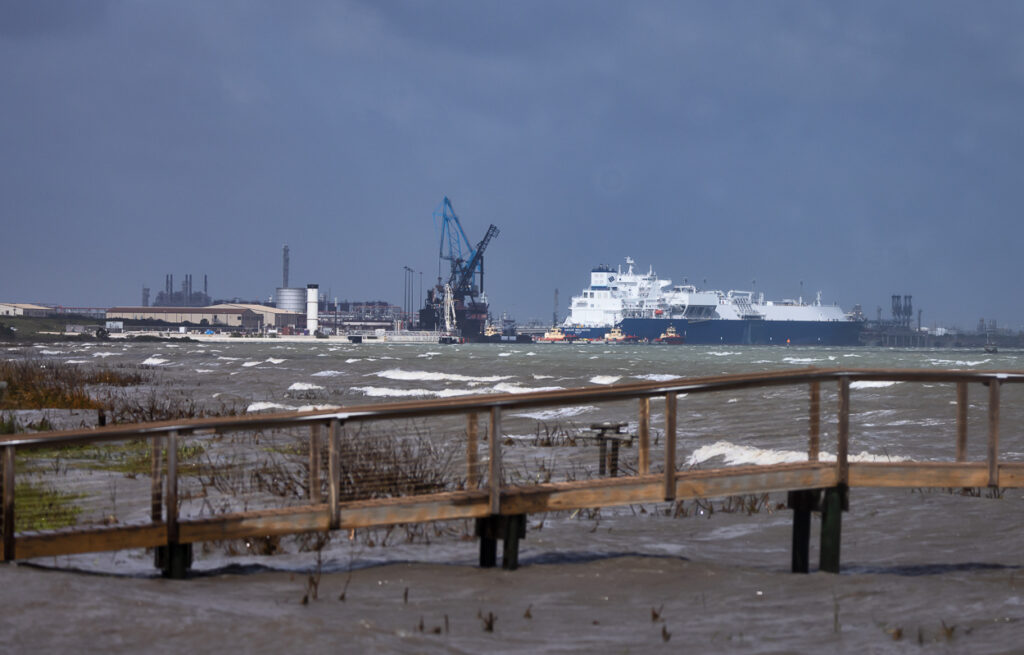BAKU – A carbon capture and storage (CCS) company owned by an oilfield giant was given the opportunity to address the UK’s pavilion at COP29, DeSmog can reveal.
The firm in question, SLB Capturi, is 80 percent owned by the world’s largest offshore drilling firm SLB, which operates in more than 120 countries and employs more than 100,000 people.
SLB Capturi appeared on a panel at a UK pavilion event hosted and sponsored by the software company AVEVA, which has over 600 oil and gas customers, including some of the world’s biggest fossil fuel companies. The event, held on Saturday 16 November, focused on the role of technology and artificial intelligence (AI) in achieving decarbonisation.
SLB, which is based in Houston, Texas, continues to operate in Russia, despite the country’s invasion of Ukraine in February 2022. The firm is the biggest Western oilfield services company still operating in Russia, has patented new oil drilling technology in the country, and is “aggressively recruiting young Russian engineers”, according to an August 2024 report by Global Witness.
Subscribe to our newsletter
Stay up to date with DeSmog news and alerts
Over the course of the 11-day COP29 summit in Baku, Azerbaijan, negotiators and leaders across the globe will put in place commitments to address the climate crisis and assist the worst-hit countries. The UK pavilion is located in the “Blue Zone”, the formal COP29 conference and negotiation space.
In March 2024, SLB bought the CCS company Aker Carbon Capture to create SLB Capturi – saying that it hoped to “shift the economics of carbon capture”.
CCS in theory works by capturing carbon dioxide from industrial sites before the gas is released into the atmosphere. The new Labour government has committed the UK to investing £22 billion in CCS over the next 25 years, claiming that it will help to create a “new era” of clean energy jobs.
However, as DeSmog has shown, most large-scale CCS projects underperform or fail to meet their capture targets. As the November 2023 UN-backed Production Gap Report pointed out: “the track record for CCS has been very poor to date, with around 80 percent of pilot projects over the last 30 years ending in failure”.”
CCS is popular among fossil fuel firms because it offers a way for them to carry on business as usual, rather than transitioning to renewables. SLB has been working on “enhanced oil recovery” in the North Sea – using new techniques to extract hard-to-reach oil from mature basins.
As reported by DeSmog, the fossil fuel industry has for years been investigating how to harness carbon capture projects for this purpose – pumping the CO2 into oilfields to maximise their fossil fuel output.
At least 480 carbon capture lobbyists have been granted access to the COP29 summit – more than were present at last year’s climate talks in Dubai, United Arab Emirates (UAE), despite the overall number of participants shrinking significantly. More than 1,700 fossil fuel lobbyists have also attended this year’s conference.
“Fossil fuel companies are promoting expensive and speculative CCS with the desperation of an industry that knows its days are numbered. CCS has repeatedly failed and underdelivered, and isn’t fit for purpose to reduce climate wreaking emissions,” said Rachel Kennerley, International carbon capture campaigner at the Center for International Environmental Law.
“Unfortunately governments seem to be misguidedly buying into the hype despite the huge costs to the public purse and the risk that it will delay real climate action.”
DeSmog also revealed last week that oil and gas giants are paying thousands to sponsor events at the flagship summit.
During the event on 16 November, SLB Capturi’s head of sustainability and communication Hanne Rolén celebrated the passing of key rules on the first day of COP29 that will make it easier for companies to invest in CCS and meet their climate commitments.
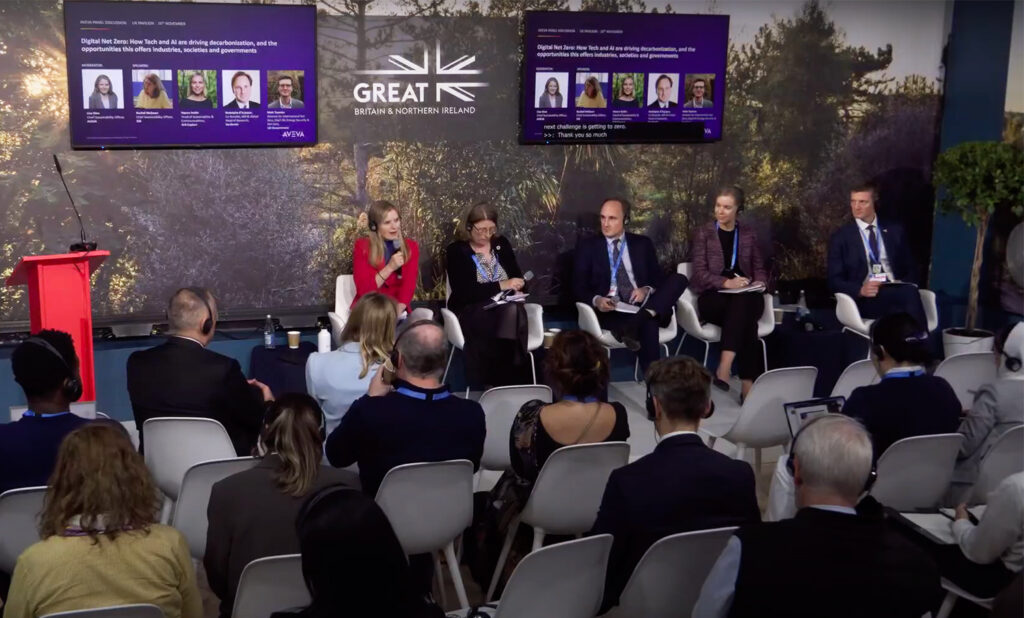
These rules have been criticised by climate groups for allowing richer countries and corporations to offset their emissions through schemes such as planting trees or investing in carbon capture technologies.
Myriam Douo of the advocacy group Oil Change International said that the decision was “a gift” for big oil and gas companies.
Rolén, however, said “let’s not have the great be the enemy of good”.
The host of COP29, Azerbaijan, is a petrostate that relies heavily on its domestic fossil fuel industry. Oil and gas accounts for 90 percent of its export revenue, while its president used a speech at the summit to call fossil fuels a “gift of God”.
SLB says on its website that the company “immediately took voluntary measures to curtail our Russian activity” following the Ukraine invasion, and that it has “consistently used the international sanctions to guide our actions”.
The UK Pavilion
The UK government has been praised for using the COP29 summit to announce a new ambitious emissions reduction target.
Referred to as a nationally determined contribution (NDC), the UK has pledged to cut its emissions by 81 percent from 1990 levels by 2035.
However, there are questions about the corporate partners that have been allowed to sponsor the UK’s pavilion in Baku.
AVEVA claims that firms use its technology to “operate more efficiently, consume less energy, and reduce waste”. However, AVEVA has boasted on its website that its software has also been used to help fossil fuel companies to extract more oil and gas.
For example, the firm claims that “by implementing AVEVA software solutions to automate its refinery processes, Kuwait Oil Company is on track to achieve its goal of producing 4 billion barrels of oil per day by 2030.”
AVEVA has also worked for some of the world’s largest and highest-emitting fossil fuel companies, including: Shell, ExxonMobil, BP, Chevron, and the Abu Dhabi National Oil Company (Adnoc).
AVEVA states that after Shell deployed its software, “the company began to gather operational data at an oil field in the Gulf of Mexico to improve performance of its wells, rigs, and drill floor equipment.”
Alongside AVEVA, the pavilion is being sponsored by DP World, the multinational logistics company owned by the Dubai government in the United Arab Emirates (UAE). The UAE derives roughly 40 percent of its income from oil and gas, while its overall climate action has been rated as “critically insufficient” by the Climate Action Tracker, an independent scientific project that measures government policies against the 2015 Paris Agreement.
The sponsors of the UK pavilion are called its “official COP29 partners”, allowing these corporations to host events featuring their spokespeople. And, while they are not afforded access to official negotiations, sponsors are given the opportunity to shape influential decision-makers through the UK’s side events.
Recent COPs have been criticised for allowing corporations – and in particular fossil fuel giants – to greenwash their reputations even while striking new oil and gas deals.
Prior to the summit, COP29 CEO Elnur Soltanov was recorded using his role to discuss “investment opportunities” in the country’s state oil company SOCAR. Last year in Dubai, the UAE used the climate conference to strike a dozen fossil fuel deals, according to Global Witness. Adnoc either negotiated or closed oil deals with 12 countries, including the UK, while its chief executive Sultan Ahmed al-Jaber was president of COP28.
On 14 November, key experts including a former UN secretary general and former UN climate chief released a statement saying that the COP climate talks are “no longer fit for purpose” and need an urgent overhaul.
There is a “systemic imbalance in COP representation” the authors said, epitomised by the fact that fossil fuel lobbyists outnumber official representatives from scientific institutions, Indigenous communities and vulnerable nations.
UN Secretary General António Guterres said at the G20 summit in Brazil on 17 November that “we must also fight the coordinated disinformation campaigns impeding global progress on climate change, ranging from outright denial to greenwashing to harassment of climate scientists”.
A Department for Energy Security and Net Zero spokesperson said: “This was an event organised independently by a sponsor at COP29.
“We continue to support carbon capture, usage and storage as it is vital in boosting our energy independence, with the Climate Change Committee describing it as a necessity, not an option, for reaching our climate goals.”
AVEVA, and SLB were approached for comment.
Subscribe to our newsletter
Stay up to date with DeSmog news and alerts


